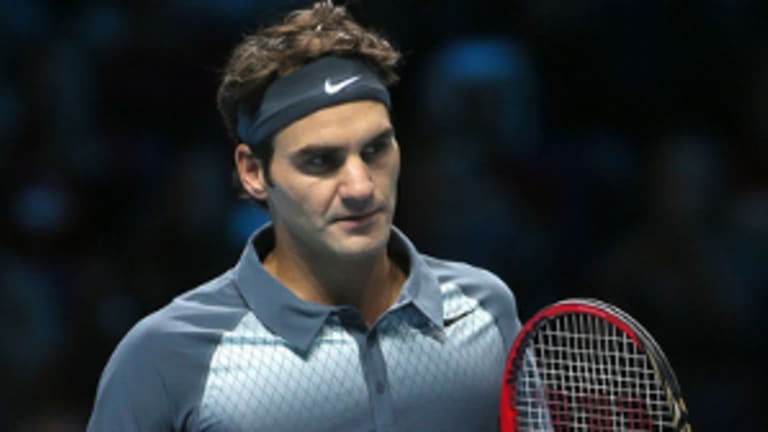If you’ve been sticking with Roger Federer and absorbing his thoughts and comments through the end of the season, you might agree that he sounds like a man who’s encountered Chicken Little and taken the fowl’s rantings for so much hooey.
“The fun has definitely returned,” Federer declared at the end of this year, through the medium of a sponsor’s (Credit Suisse) website. “I can see no reason why I shouldn't play better again in 2014, and have some great wins.”
Could this have been the same man who, after losing to Novak Djokovic for the second time in five days at the ATP World Tour Finals, barely was able to keep the steam from shooting from his ears?
When a reporter asked Federer if he was encouraged by having taken a set off Djokovic in each loss, he drawled, “Yeah, sure. Let’s see it that way. Great, we’re positive. It was great to win two sets off Novak and losing four. Losing a match, it’s really exciting.”
Actually, it was two matches you lost, Roger.
But we’ll forgive the oversight because we know those two hurt. But they apparently didn’t hurt all that much, because just days later Federer spoke of how the fun had returned and declared himself all in for 2014:
“I have still got some major goals, because I certainly haven't forgotten how to play tennis; after all, I was still number one in the fall of 2012, and at the end of the season, once my back was better, my results also improved.”
You can dismiss that as an attempt by the all-time Grand Slam singles champion to buck up the troops. After all, their (his) previously unassailable morale had taken a severe beating through long stretches of 2013, as Federer won just one tournament—that one merely a Wimbledon tune-up, a lowly ATP 250 played in the German town of Halle. For the first time, Federer’s army of fans had to endure heavy, repeated shelling as he lost his bearings and appeared to fall victim to the worst enemy of a fighting man, panic.
But this is Roger Federer we’re talking about, and even that mid-summer lapse, occasioned by a vortex of factors—including an ill-fated attempt to switch to a 98 square-inch racquet for the first time in his pro career—was not too much to endure and overcome. Perhaps he remembered what Sergiy Stakhovsky had said after sending Federer into his tailspin with his second-round upset of the defending champ at Wimbledon.
“When you play Roger Federer at Wimbledon, it’s like you’re playing two persons. First you play Roger Federer and then you play his ego. When you’re beating one, you still have the other one who is pressing you. You’re saying, ‘Am I about to beat him? Is it possible?’”
When you panic, Federer probably realized, the other guys are much more inclined to realize that there’s really only one Roger Federer, the 32-year-old who can shank a backhand with the best of them, and who’s probably a twitch slower and a mite less eager to leave it all out there on any given day than he was at 26. So, with a show of hubris that is simultaneously crafty and comical (aren’t these athletic superheroes, in their own ways, all a bit over the top?), Federer has rushed to revive that other opponent to whom Stakhovsky alluded.
I certainly haven't forgotten how to play tennis; after all, I was still number one in the fall of 2012. . .
